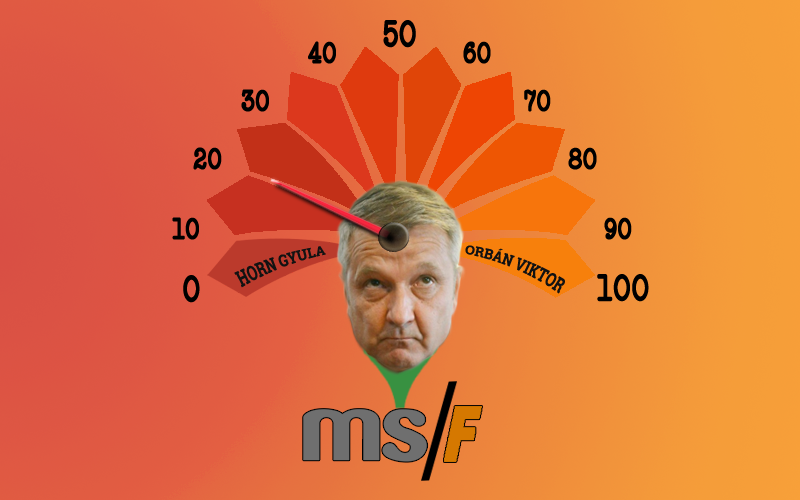The https://english.atlatszo.hu use cookies to track and profile customers such as action tags and pixel tracking on our website to assist our marketing. On our website we use technical, analytical, marketing and preference cookies. These are necessary for our site to work properly and to give us inforamation about how our site is used. See Cookies Policy
Comeback leader at the helm of flailing political opposition
A former prominent of the socialist MSZP was recently elected the party’s chairman with the mandate to reform the side that has seen better days for the 2018 general elections. Atlatszo.hu looked at the career of Gyula Molnar to find a former socialite-turned-politician, who is a thorn in the side of many for his disturbingly friendly relations with the governing political right.
Ever since the party’s own political chicanery and poor management of the economy led to a spectacular failure at the 2010 general elections, the socialist MSZP has been struggling to even stay afloat much less reassert itself as a formidable political power on the field still dominated by Viktor Orban’s Fidesz. At the party’s most recent assembly, the task to rebuild the side, even though victory is an unrealistic expectation for 2018, fell on Gyula Molnar.

Molnar is not a newcomer to politics, but his reemergence after years of absence from the frontline was a surprise.
Molnar hails from a steady middle-class background. In his youth, he enjoyed the party scene, liked going out and liked women who liked him back. Those who know him either praised his ability to connect with people those who disliked him dismissed him as being full of air and no substance for the same reason. His finances today show a similar arrangement, decent housing but nothing fancy, a mid-category Volvo and a mortgage that he is fastidiously paying off from his salary as representative in a Budapest district assembly as well as a fee for serving on the board of a city-owned utility.
Molnar, currently 55 years old, studied in Moscow’s textile industry university, where he studied as a chemical engineer. Several other Hungarians who have since become important members of the country’s business and political elite also studied in Moscow at around the same time, which is how Molnar has made friends who are today on a completely different section of the political aisle. One of them is a business associate of an oligarch that is favored by the system.
After returning from his studies in the ’80s, Molnar started out woking in his field, then he joined the youth group of the communist party. This is when he met yet another important friend who has since become an advisor to the likewise Fidesz-supported mayor of Budapest, Istvan Tarlos. Starting 1990, Molnar was actively building his political career as he also rose through the ranks of the left wing. He started out as district deputy mayor in 1990, then he served as district mayor between 2002 and 2010 while simultaneously serving as a member of parliament from 1994 to 2010. His mayoral career is all the more remarkable, since he was one of the few MSZP mayors who managed to get reelected in 2006, after his party was embroiled in a national scandal shortly after winning the general elections a few months earlier.
The Fidesz party had its sights on him afterwards, he was targeted in a criminal investigation shortly before the 2010 general elections in relation to charges that he misused his power in attributing ownership of municipal property to private owners. There were other curious matter during his mayorship. Although his district imposed a mandatory closing time for local bars and party places, it gave arbitrary exemption to two spots that were very popular at the time. Atlatszo.hu also managed to link Molnar to a company that had suspect dealings, although without any confirmation of wrongdoing.
Nonetheless, Molnar is now at the head of his party. His critics, however, tend to cite his long-standing friendly relationship with those close to Fidesz, accusing him of collaborating with the enemy. None of the rumors that would support these claims have been substantiated.
In his public appearances since his appointment, Molnar has shown the image of an ambitious leader looking to get things done. However, he has his wok cut out for him, not only because of the many tensions and interests that are straining his own party, but the discord that characterizes the entire political left, which for years has been more preoccupied with taking away votes from one-another than being able to mount a viable challenge on Viktor Orban.
Share:
Your support matters. Your donation helps us to uncover the truth.
- PayPal
- Bank transfer
- Patreon
- Benevity
Support our work with a PayPal donation to the Átlátszónet Foundation! Thank you.
Support our work by bank transfer to the account of the Átlátszónet Foundation. Please add in the comments: “Donation”
Beneficiary: Átlátszónet Alapítvány, bank name and address: Raiffeisen Bank, H-1054 Budapest, Akadémia utca 6.
EUR: IBAN HU36 1201 1265 0142 5189 0040 0002
USD: IBAN HU36 1201 1265 0142 5189 0050 0009
HUF: IBAN HU78 1201 1265 0142 5189 0030 0005
SWIFT: UBRTHUHB
Be a follower on Patreon
Support us on Benevity!

